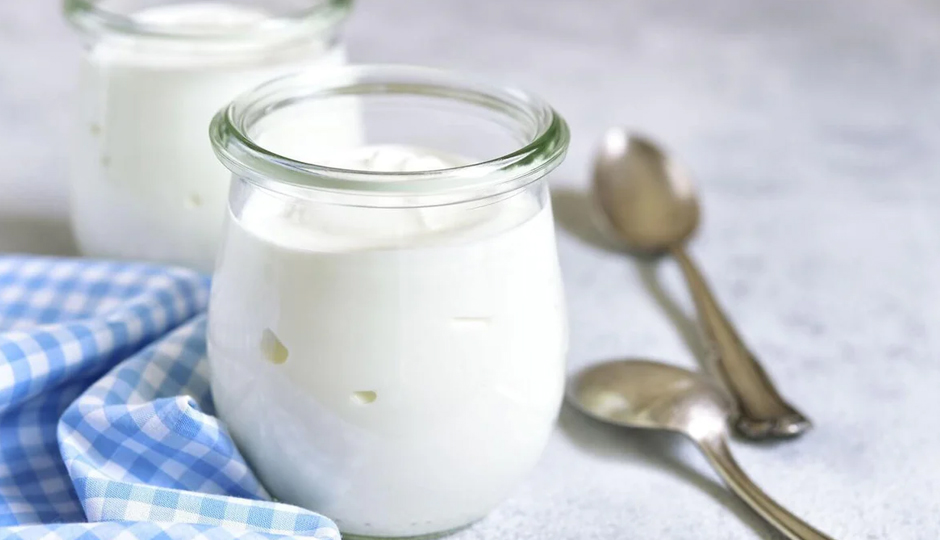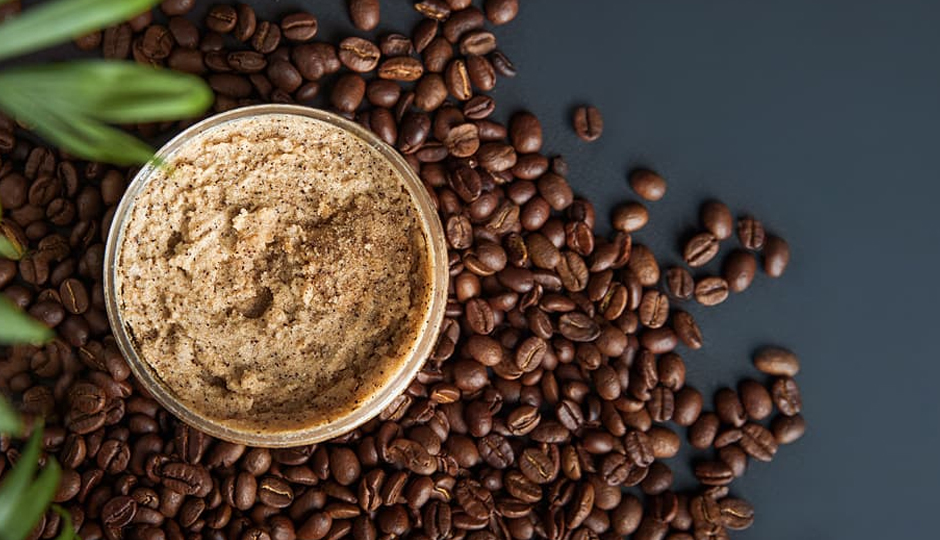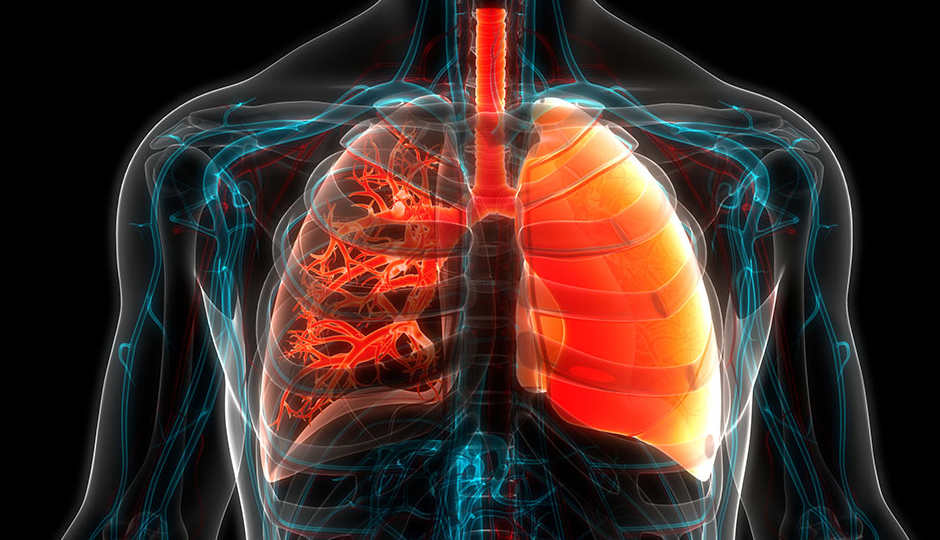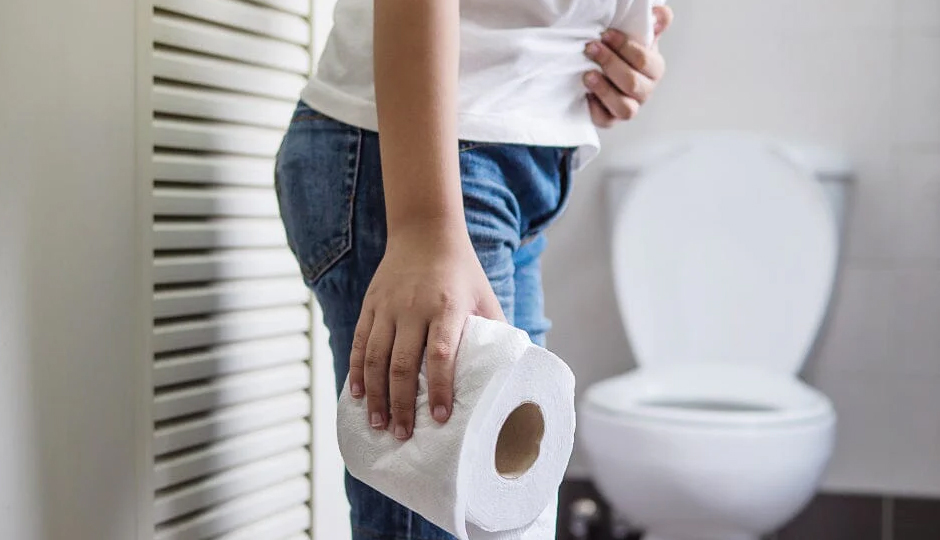- Home›
- Healthy Living›
- How To Treat Scabs On The Scalp
How To Treat Scabs On The Scalp
By: Priyanka Maheshwari Thu, 05 Oct 2023 10:51:19

Are you dealing with prickly, itchy, and crusty bumps on your scalp that seem impossible to stop scratching? If you're searching for effective ways to treat scabs on the scalp, you're in the right place. The urge to scratch your scalp can be painful, embarrassing, and uncomfortable. However, understanding the reasons behind their formation and learning how to treat them can provide relief.
In this article, we cover everything you need to know about scalp scabs and how to care for your scalp properly. Continue reading to gain valuable insights.

What Are Scabs On The Scalp?
Frequent scratching of your scalp can lead to damage to the outer skin, prompting the healing process where platelets clump together to form scabs. These scabs, ranging in color from yellowish to reddish, brown, or black, are intensely itchy and excessive scratching may result in bleeding.
Scalp scabs can emerge due to various reasons, whether it be an oily scalp or an indication of a more severe medical condition such as eczema or psoriasis. Identifying the precise cause is crucial for effective treatment. Here are some potential causes to consider.
What Causes Scabs On The Scalp?

# Oily Scalp
Individuals with an oily scalp are susceptible to dandruff, leading to itching and subsequent scratching. This scratching can result in the formation of scabs.

# Seborrheic Dermatitis (Dandruff)
Seborrheic dermatitis is a condition marked by scaly patches and persistent dandruff. Its symptoms include itching and flaking without noticeable inflammation. Although not contagious, it can be easily treated with over-the-counter medications or prescription drugs in severe cases.

# Scalp Psoriasis
Psoriasis, a chronic skin condition triggered by an overactive immune system, results in thick, red patches covered with silver or gray scales. When these psoriasis patches develop on the scalp, they can lead to the formation of scabs.

# Lichen Planopilaris
If you observe red or purple bumps on your scalp that transform into scabs, it might be lichen planopilaris. This inflammatory condition causes scaling and redness around hair follicles, often leading to scarring alopecia (hair loss). The red and purple bumps associated with this condition can evolve into scabs.
As per a 2022 cross-sectional study conducted by the All Of Us research program, lichen planopilaris was most prevalent among individuals aged 65-74, followed by those in the 55-64 age group. Out of the 327,654 participants, 142 were diagnosed with this condition, with a higher prevalence observed in women (91.6%).
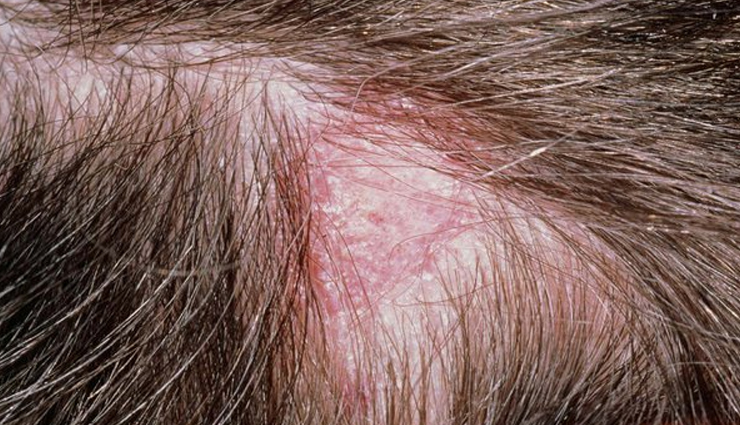
# Ringworm
Ringworm, despite its name, is not a form of worm but rather a fungal infection. Specifically referred to as Tinea capitis, this condition targets the scalp and hair shafts, leading to the development of circular patches characterized by itchy, scaly skin. Typically, these patches exhibit flat centers and raised borders, which can ultimately result in the formation of pruritic (itchy) scabs on the scalp.

# Scabies
Scabies is a condition that can lead to the formation of scabs, and it is caused by the Sarcoptes scabiei mite. These tiny mites burrow into the skin of the host, triggering intense itching and the development of thick, crusted layers of skin. While scabies is frequently observed in children, it can affect individuals of all ages, including both men and women. Common areas affected by scabies include the neck, scalp, face, eyelids, and the skin beneath the nails.
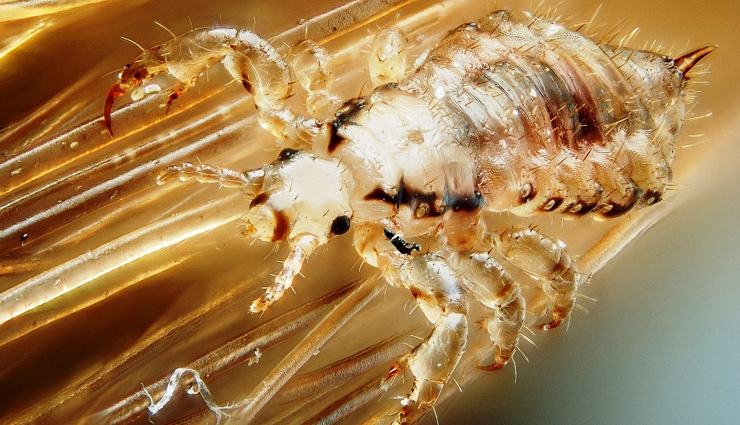
# Head Lice
Head lice are highly contagious and a significant nuisance. In addition to feeding on blood, they cause intense itching. Persistent scratching of the head can result in wounds, eventually leading to the formation of scabs.
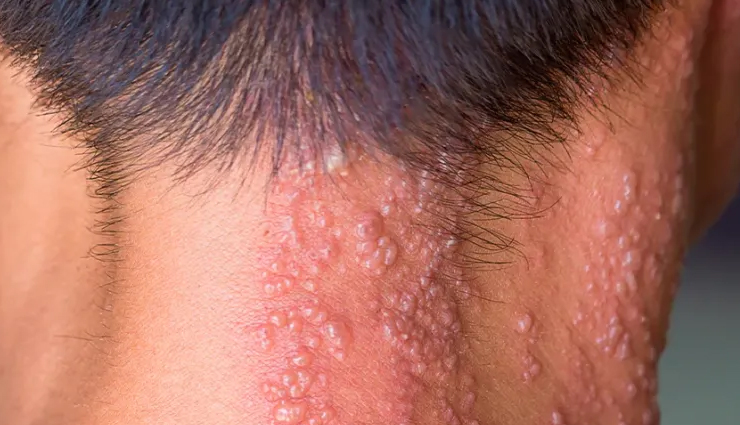
# Shingles
Contrary to popular belief, chickenpox doesn't occur just once in a lifetime. The virus responsible for chickenpox can remain dormant in your body and later reactivate, causing shingles. The shingles outbreak includes small, yellow blisters that can appear on your scalp, eventually crusting over to form scabs.
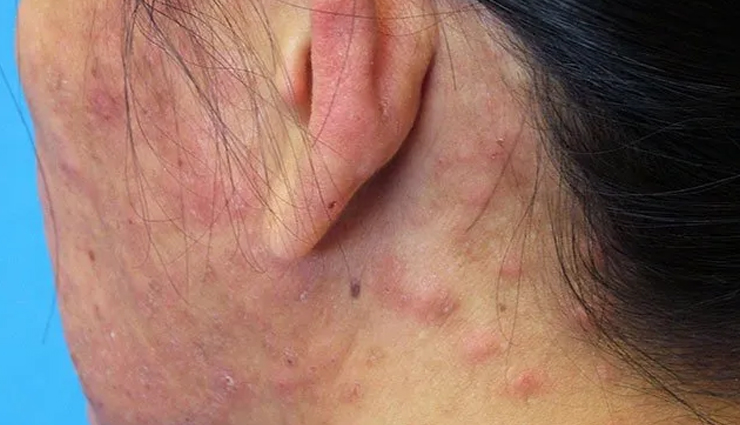
# Eosinophilic Folliculitis
This severe condition primarily affects individuals with HIV/AIDS, leading to itchy, pus-filled lesions on the skin and scalp that can develop into scabs upon healing.

# Skin Inflammation
Intense itching, known as pruritus, is a prevalent symptom of skin inflammation. This severe itchiness can result in scalp irritation, leading to scab formation.

# Contact Dermatitis
Contact dermatitis, a skin disorder triggered by allergic reactions or irritants, causes redness, itching, and lesions on the skin. In the case of the scalp, this irritation can lead to scabbing.
# Impetigo
Impetigo, a common bacterial infection prevalent in children aged two to five years, manifests as honey-colored crusts on the skin and occasionally on the scalp.

# Scalp Acne
Acne vulgaris, a persistent skin inflammation, leads to small bumps, redness, and lesions on the skin due to excessive sebum production. While commonly found on the face, neck, and back, it can also affect the scalp.

# Scalp Folliculitis
This chronic inflammatory condition directly impacts hair follicles, resulting in yellowish-white scabs on the scalp.

# Skin Picking
Skin picking, a psychological disorder, involves repetitive picking of the skin, leading to tissue damage. This habit can result in scabs, which worsen due to the constant pulling of the skin.
Identifying scalp scabs can be challenging and may lead to more significant problems such as severe hair loss, infections, and scalp inflammation. Here are a few symptoms you should watch for in addition to the presence of scabs.
Other Symptoms To Look Out For
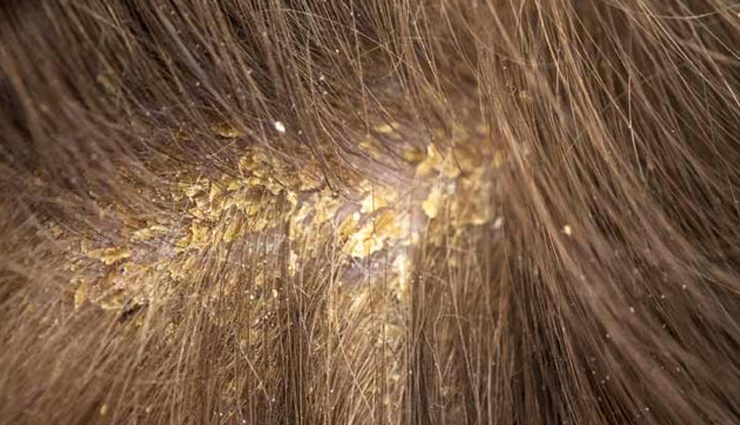
# White/Yellow Scabs
Excessive use of thick conditioners, ointments, lotions, or hair cream can trap moisture within scabs, causing them to appear white. Yellow scabs indicate the presence of infectious pus, leading to the formation of sores.
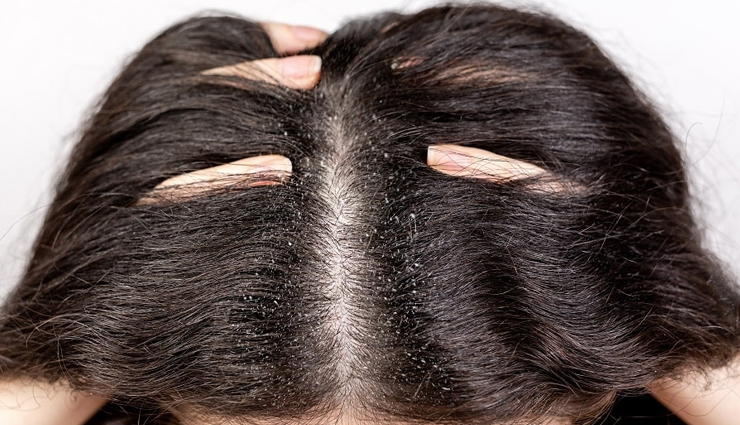
# Hair Loss
If you experience hair loss in areas where red and purple bumps and scars are present on your scalp, seek evaluation, as it could be a sign of scarring hair loss conditions like lupus or lichen planopilaris.
# Recurring Scabs in the Same Spot
If scabs reappear in the same spot on your scalp, it might be a symptom of melanoma, a potentially serious condition that requires immediate attention.
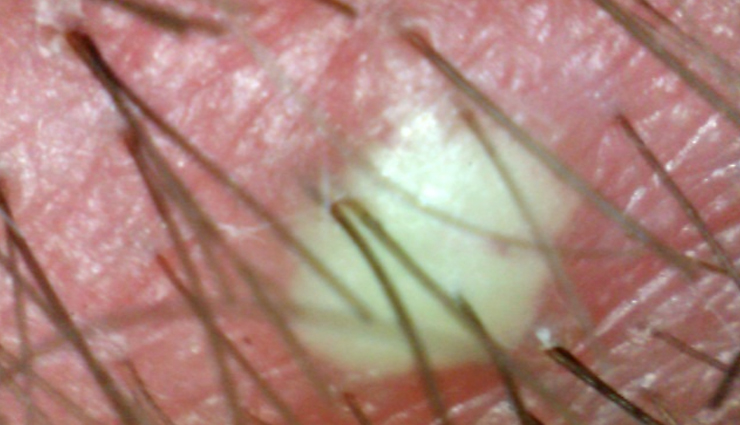
# Green Pus
The presence of green pus in scalp scabs signals an infection and should raise concern.
Now, you no longer need to wonder, "Why do I have crusty scabs on my scalp?" Instead, let's explore some simple remedies to address these issues.
Note:
If you notice any of the above symptoms, it's crucial to consult a doctor before attempting natural treatments. Perform a patch test to ensure there are no adverse reactions to the remedies mentioned below.
How To Treat Scabs On The Scalp The Natural Way
As scabs are a natural part of the skin healing process, they typically fall off and heal on their own. However, if they cause discomfort, there are several home remedies available to expedite the healing process and remove the scabs. These scalp scab treatments utilize common ingredients found in your pantry.
How To Treat Scabs On The Scalp
For stubborn and itchy scalp scabs, a warm compress can be highly effective in softening the scabs and facilitating their removal.
Ingredients:
Towel
Hot water
Comb
Instructions:
- Soak the towel: Start by soaking the towel in hot water. Ensure it's comfortably hot but not scalding.
- Wring out excess water: After soaking, wring out the excess water from the towel.
- Wrap the towel: Roll up your hair and wrap the warm, damp towel around your head, covering the affected area.
- Leave it on: Let the warm compress sit on your scalp for 10-15 minutes. This allows the warmth to soften the scabs.
- Remove the towel and comb gently: After the allotted time, carefully remove the towel. Use a comb to gently comb out the softened scabs from your hair. Be gentle to avoid irritation.
- Repeat: Perform this warm compress treatment once daily for a few days to help the scabs fall off naturally.
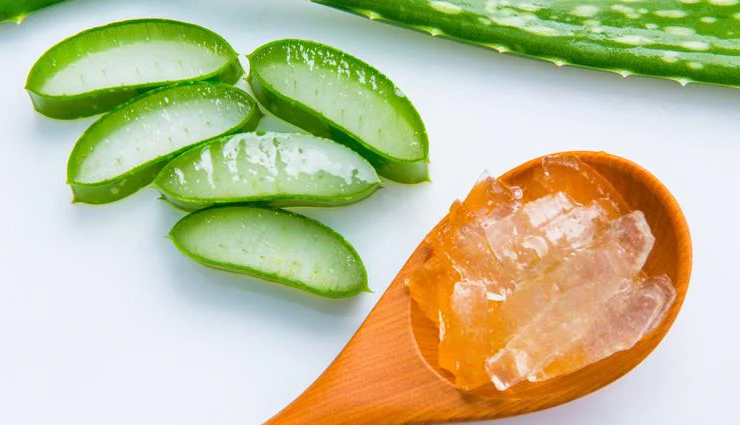
# Aloe Vera Gel
Aloe vera gel is renowned for its soothing properties and can effectively alleviate various causes of scalp scabs such as seborrheic dermatitis, dandruff, eczema, and psoriasis. It not only reduces pain and itching around the scabs but also prevents potential infections.
Ingredients:
Aloe vera leaf
2 vitamin E capsules
Instructions:
- Extract aloe vera gel: Cut open an aloe vera leaf and extract the gel using a spoon or knife. Ensure you collect a sufficient amount.
- Prepare vitamin E mixture: Squeeze out the oil from 2 vitamin E capsules and blend it thoroughly with the aloe vera gel. Mix until you achieve a consistent blend.
- Application: Use your fingers to apply this mixture directly onto the scalp scabs. Ensure you cover the affected areas evenly with the gel.
- Allow it to sit: Let the mixture sit on your scalp scabs for about an hour. This allows the healing properties of aloe vera and vitamin E to work effectively.
- Rinse with mild shampoo: After an hour, wash off the aloe vera and vitamin E mixture using a gentle, mild shampoo. Ensure all residues are completely removed.
- Frequency: Repeat this treatment two or three times a week to experience optimal results. Regular application can significantly reduce discomfort and promote healing.
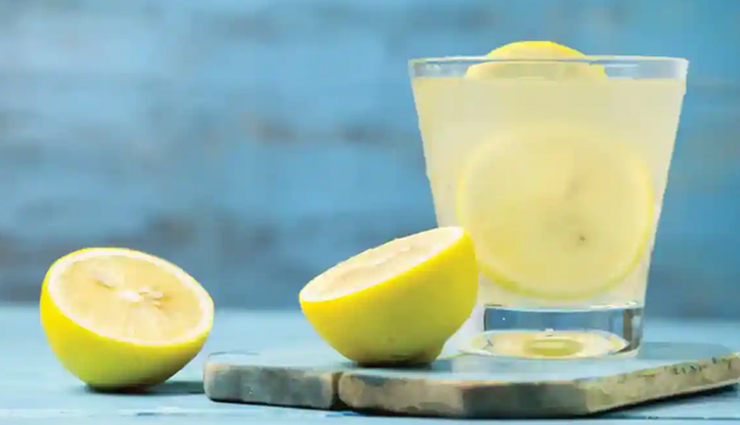
# Lemon Juice
Lemon juice is effective in combating dryness and itchiness on the scalp. Its antifungal properties make it valuable in treating dandruff and ringworm, common causes of scalp scabs. To mitigate its harshness, it's essential to blend it with a mild carrier oil.
Ingredients:
½ teaspoon lemon juice
1 tablespoon olive oil
Instructions:
- Warm the olive oil: Heat the olive oil in a microwave for a few seconds until it becomes warm. Be cautious not to overheat it.
- Mix lemon juice and olive oil: Combine the lemon juice with the warm olive oil. Blend the two ingredients thoroughly to create a uniform mixture.
- Massage onto the scalp: Gently massage the lemon juice and olive oil mixture onto your scalp. Ensure you cover all the affected areas.
- Allow it to penetrate: Let the mixture sit on your scalp for approximately half an hour. This allows the beneficial properties to penetrate and work effectively.
- Shampoo it off: After half an hour, wash off the mixture using a mild, gentle shampoo. Ensure all residues are thoroughly rinsed away.
- Frequency: Repeat this treatment three times a week. Regular application can significantly alleviate dryness, itching, and the formation of scabs on the scalp.
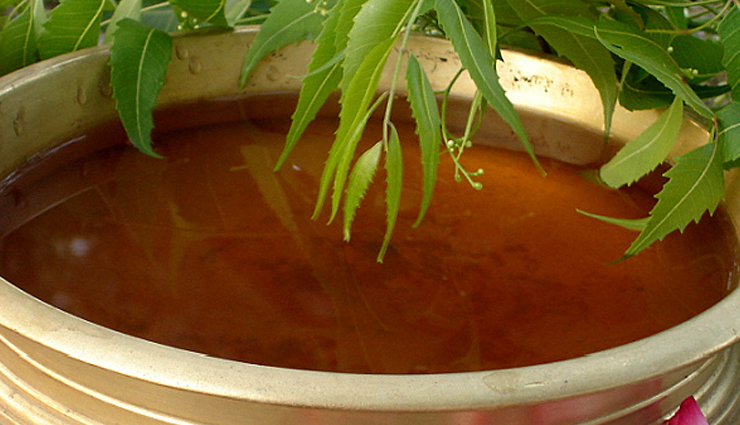
# Neem Leaves
Neem leaves, also known as Indian lilac, possess potent properties that can alleviate itchy skin conditions. Their natural antifungal and antibacterial attributes aid in eliminating scabs and preventing potential scalp infections.
Ingredients:
10-15 neem leaves
2 cups of water
Instructions:
- Boil neem leaves: In a pot, boil 10-15 neem leaves in two cups of water. Allow the leaves to simmer until the water absorbs their beneficial properties.
- Strain and cool: After boiling, strain the neem water to remove any leaves or impurities. Let the liquid cool down to a comfortable temperature.
- Rinse your hair: Use the neem water to thoroughly rinse your hair every day. Ensure the solution comes into contact with the affected areas of your scalp.
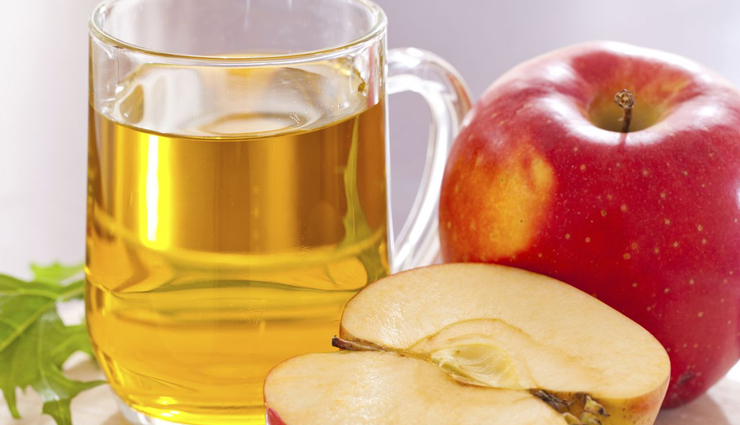
# Apple Cider Vinegar
Apple cider vinegar is renowned for its efficacy in addressing various skin and hair concerns. Its potent antibacterial and antifungal properties, along with its ability to balance scalp pH, make it a popular home remedy. A Palestinian study even demonstrated its effectiveness in preventing dandruff and other hair issues. Additionally, it acts as a natural hair cleanser, ensuring a clean and healthy scalp.
Ingredients:
2 tablespoons apple cider vinegar
1 cup warm water
Instructions:
- Prepare the mixture: Mix 2 tablespoons of apple cider vinegar with 1 cup of warm water.
- Apply to the scalp: Pour the apple cider vinegar solution onto your scalp, ensuring it reaches the affected areas.
- Massage the scalp: Gently massage your scalp for a few minutes, allowing the solution to penetrate the skin.
- Rinse thoroughly: Rinse your hair thoroughly with water to remove the vinegar solution.
- Frequency: Follow this routine twice a week to maintain a healthy scalp and prevent scabs.
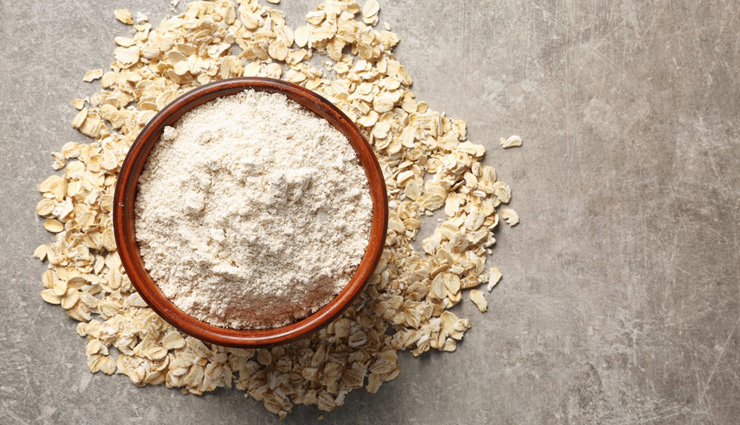
# Oatmeal
Oatmeal often deemed a simple breakfast staple, possesses remarkable properties for skin health and can effectively treat scalp scabs. It excels in soothing irritated skin and provides intense moisture. Research indicates that oats have the potential to alleviate itching, burning, scaling, and various other discomforts associated with the scalp and skin.
Ingredients:
2 tablespoons uncooked oatmeal
Water
Instructions:
- Prepare the paste: Mix a sufficient amount of water with the oatmeal to create a thick paste.
- Application: Apply the oatmeal paste generously over your scalp, ensuring it covers the affected areas completely.
- Leave it on: Let the oatmeal paste sit on your scalp for approximately 10 minutes, allowing it to work its soothing magic.
- Rinse thoroughly: Wash off the oatmeal paste thoroughly using a mild shampoo, ensuring all residues are removed.
- Frequency: Incorporate this treatment into your daily routine for optimal results in managing scalp scabs.
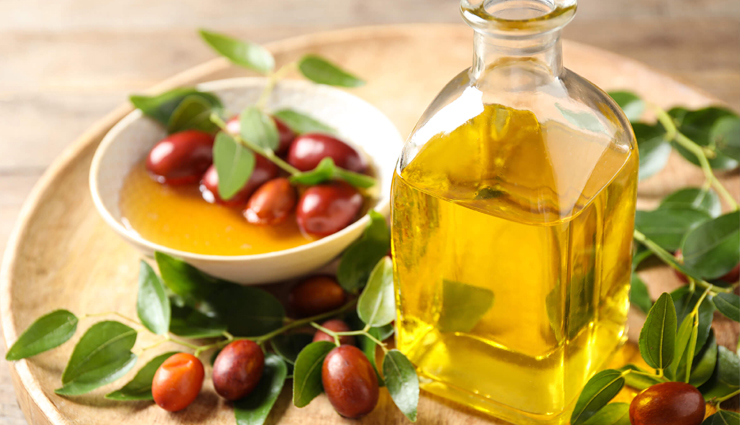
# Jojoba oil
Jojoba oil is often hailed as a miracle worker in skincare due to its exceptional properties. It offers relief from inflammation, burning, bumps, and itching while promoting wound healing. This versatile oil aids in managing conditions like eczema and psoriasis. Furthermore, jojoba oil prevents scalp dryness, stimulates hair growth, and protects the scalp from infections that can lead to scabs. Its ability to balance natural scalp oils contributes to reducing scabs effectively.
Ingredients:
Jojoba oil
Instructions:
- Apply jojoba oil: Take a small amount of jojoba oil and gently massage it onto your scalp before bedtime. Ensure it covers the affected areas thoroughly.
- Leave it overnight: Allow the jojoba oil to work its magic overnight. Leave it on while you sleep to maximize its effectiveness.
- Morning wash: The next morning, wash your hair using a mild shampoo, thoroughly removing the jojoba oil and any impurities from your scalp.
- Frequency: Incorporate this treatment into your routine twice a week for consistent and beneficial results in managing scalp scabs.
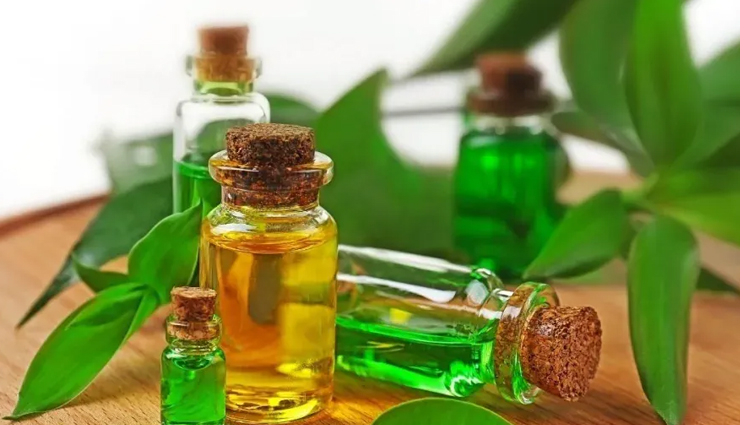
# Tea Tree Oil
Tea tree oil is renowned for its antifungal, antibacterial, antiseptic, and anti-inflammatory properties. It proves highly effective in combating dandruff, scalp lesions, and various scalp disorders, providing relief from itching and promoting overall scalp health.
Ingredients:
1 teaspoon tea tree oil
2 tablespoons almond oil
Instructions:
- Prepare the mixture: Combine one teaspoon of tea tree oil with two tablespoons of almond oil in a small bowl. Mix them thoroughly to create a potent yet soothing blend.
- Massage onto scalp: Gently massage the tea tree and almond oil mixture onto your scalp. Ensure that the entire affected area is covered for maximum efficacy.
- Allow it to work: Let the oil mixture sit on your scalp for about 30 minutes. This allows the beneficial properties of tea tree oil to penetrate the scalp and provide relief.
- Shampoo and rinse: After 30 minutes, wash your hair thoroughly using a mild shampoo. Ensure all the oil is rinsed off completely.
- Frequency: Incorporate this treatment into your hair care routine three times a week to experience the full benefits of tea tree oil for your scalp.
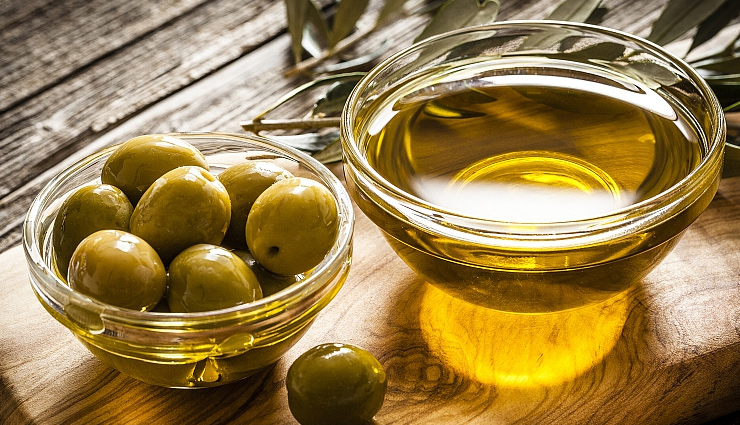
# Olive Oil
Indulge your scalp with the nourishing benefits of olive oil, a natural remedy that not only pampers your skin but also helps alleviate scabs. Olive oil contains hydrating squalene, which moisturizes your scalp, aiding in the gentle removal of scabs. Additionally, it nourishes your hair, leaving it irresistibly soft. Olive oil has long been revered for its effectiveness in addressing various skin and scalp concerns such as dandruff, dermatitis, eczema, psoriasis, and rosacea, conditions characterized by scaling and itching.
Ingredients:
4 tablespoons olive oil
Instructions:
- Warm the olive oil: Heat 4 tablespoons of olive oil in a microwave for a few seconds until it becomes comfortably warm.
- Massage onto scalp: Apply the warm olive oil onto your scalp, ensuring even coverage. You can also extend the application to the entire length of your hair for added nourishment.
- Leave it overnight: Let the olive oil treatment work its magic by leaving it on overnight. This allows your scalp and hair to absorb its beneficial properties fully.
- Shampoo in the morning: The next morning, wash your hair thoroughly with a mild shampoo to remove the olive oil. Ensure your hair is clean and free from residue.
- Frequency: For optimal results, repeat this treatment three times a week. Consistent application will help in effectively managing scalp issues and promoting overall scalp health.
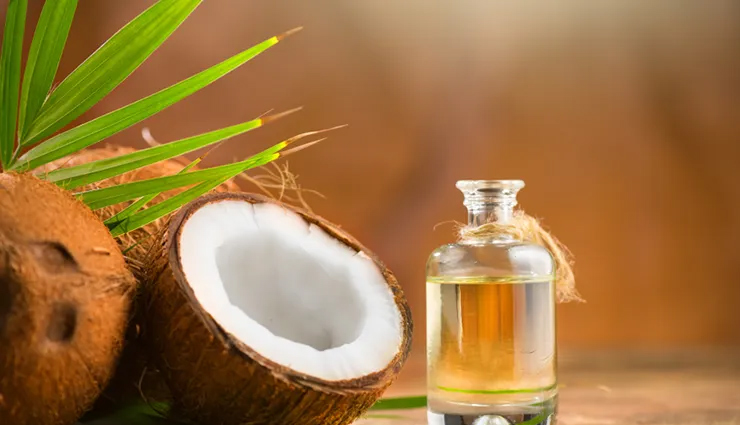
# Coconut Oil
Coconut oil, renowned for its exceptional moisturizing properties, is a natural solution for dry scalp and flaking. It effectively addresses common scalp issues such as dandruff, eczema, and dermatitis, while also acting as a preventive measure against head lice. By combining it with witch hazel, which is believed to regulate excess oil production, this treatment provides comprehensive care for your scalp.
Ingredients:
Coconut oil
Witch hazel
Instructions:
- Apply coconut oil: Begin by gently massaging coconut oil all over your scalp, ensuring complete coverage.
- Prepare the towel: Warm a clean towel by running it under hot water. Wring out the excess water, leaving the towel comfortably warm.
- Wrap the towel: Carefully wrap the warm towel around your head, covering your oiled scalp. This helps in maximizing the absorption of the coconut oil and witch hazel.
- Leave it on: Allow the treatment to work its magic for approximately one hour. This duration ensures that your scalp absorbs the beneficial properties of the oils thoroughly.
- Shampoo your hair: After an hour, wash off the coconut oil and witch hazel blend with a mild shampoo. Ensure your hair is clean and free from any residual oil.
- Frequency: To maintain a healthy scalp, follow this routine three times a week. Consistency is key to achieving the best results in managing scalp dryness and promoting overall scalp health.
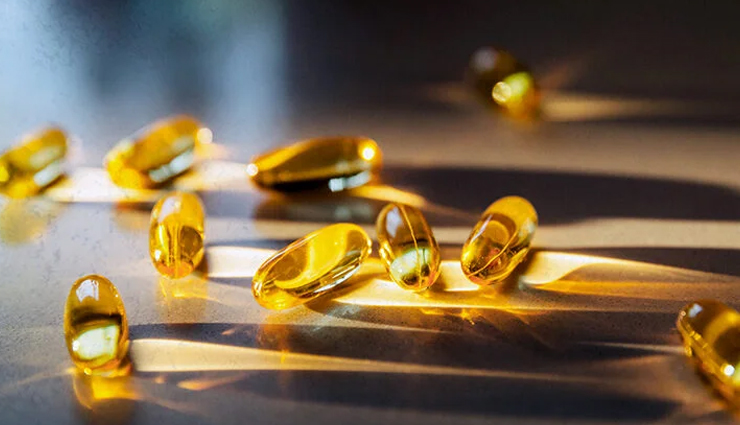
# Fish Oil Or Omega-3 Supplements
Fish oil, renowned for its high content of beneficial fatty acids, serves as a natural remedy for various skin issues, including dermatitis and allergies. Its richness in omega-3 polyunsaturated fatty acids (PUFA), particularly docosahexaenoic acid (DHA) and eicosapentaenoic acid (EPA), contributes significantly to skin protection. The anecdotal evidence supporting the use of omega-3 fatty acids for scalp health underscores its potential benefits.
Key Components:
Omega-3 polyunsaturated fatty acids (PUFA)
Docosahexaenoic acid (DHA)
Eicosapentaenoic acid (EPA)
Alpha-linolenic acid (ALA)
Linoleic acid (LA)
Benefits for Skin and Scalp:
Skin Protection: The omega-3 fatty acids in fish oil, especially DHA and EPA, play a vital role in safeguarding the skin against various issues, such as dermatitis and allergies.
Scalp Health: Anecdotal evidence suggests that omega-3 fatty acids contribute to scalp health, potentially addressing concerns related to dryness and irritation.
Hair Stimulation: Fish oil stimulates hair growth, promoting a healthy scalp environment conducive to hair development.
Cleansing Properties: Fish oil helps maintain a clean scalp, ensuring optimal conditions for hair growth and overall scalp well-being.
Besides these home remedies for scalp issues, some preventive care can also help relieve this problem.
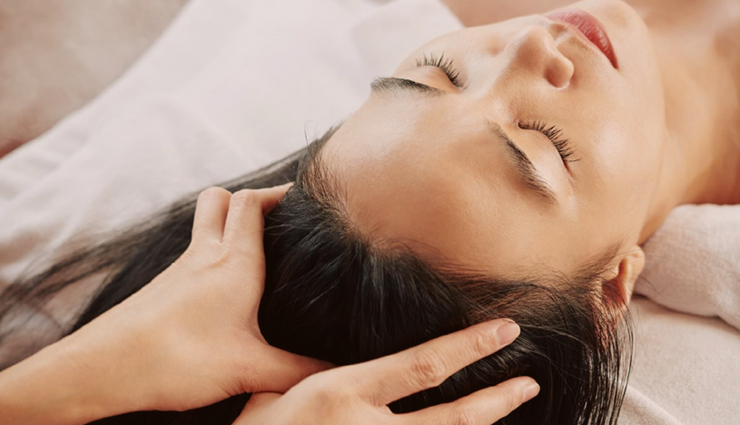
Prevention Through Awareness:
Scabs on the scalp often stem from irritation; therefore, avoiding scalp irritants is key to prevention.
Appropriate Product Selection:
Choose products tailored to your skin and hair type, opting for those designed for sensitive scalps to minimize adverse effects.
Purge Impurities and Product Build-Up:
Regularly exfoliate your scalp with scrubs or detox your hair and scalp to remove impurities and product build-up, reducing the risk of irritation.
Rehydrate and Nourish:
Rehydrate your scalp with treatments rich in vitamins and nutrients. Combine these treatments with scalp massages to enhance blood circulation, nutrient distribution, and sebum control, promoting scalp health.
Explore Advanced Solutions:
Consider advanced treatments like laser therapy, which anecdotal evidence suggests can stimulate blood flow and foster hair growth.
Avoid Itching:
Itching scabs can lead to scalp blister formation and potential scarring. Invest in anti-itch scalp treatments or dandruff remedies to alleviate this issue.
Combat Infections:
Utilize antibacterial or antifungal scalp treatments to address common scalp infections effectively.
Consult a Specialist:
For severe infections or dermatological concerns, consult a trichologist. Medicated shampoos and topical corticosteroid creams or retinoids might be recommended for optimal scalp health.
Prioritize Nutrition:
Acknowledge the connection between diet and scalp health. Follow a nutritious diet to maintain scalp moisture and support healthy hair growth. Consider incorporating probiotics into your diet for enhanced scalp health. Stay proactive in maintaining your scalp's well-being for vibrant, healthy hair.

